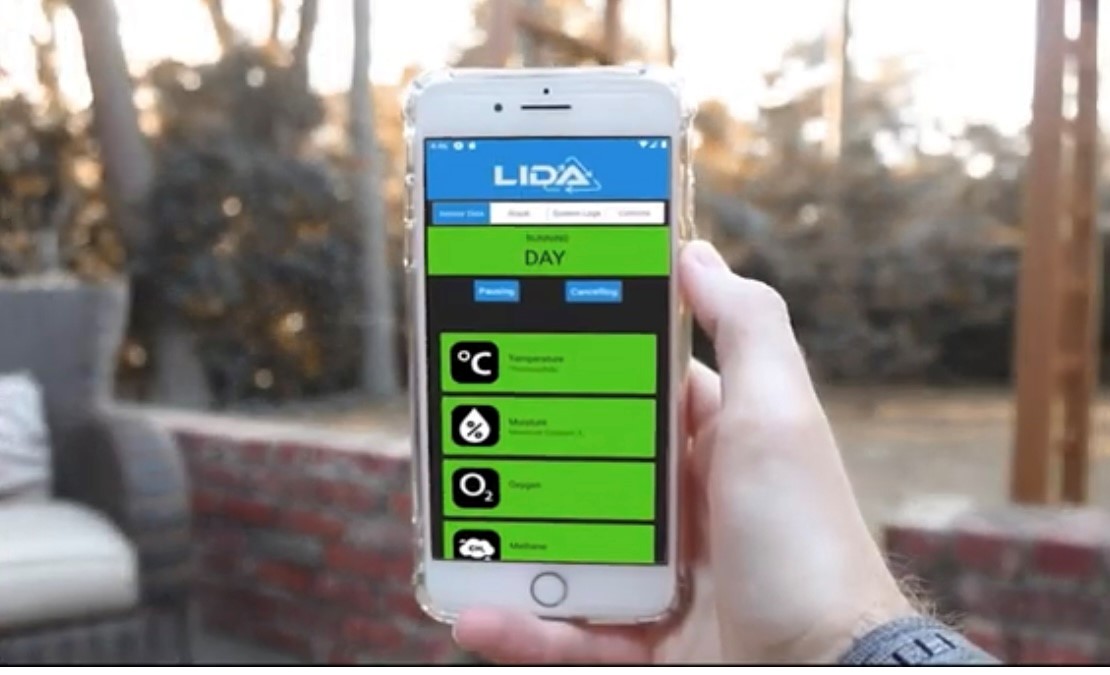Automated composting system wins Swinburne’s ‘Design for Change’ competition

Sensors in the LIDA composting system collect data about oxygen, carbon dioxide, temperature and moisture levels which is uploaded to the cloud and can be viewed on a mobile app.
In summary
- A team of Bachelor of Computer Science students has won Swinburne’s 2022 ‘Design for Change’ competition
- They developed a mobile app to control motors and sensors of a composter prototype called LIDA, created by a new start-up industry partner
- The prototype speeds up the decomposition rate of organic matter to produce compost in as little as 60 days
An automated composting system designed by Swinburne Bachelor of Computer Science students has won Swinburne’s 2022 ‘Design for Change’ competition.
Final year students Nick French, Alex Morris, Jackson Semmens, and Trung Doan collaborated with second year student Ben Szekely. Expanding on a project that was started in 2021, the five students developed a mobile app to control motors and sensors of a composter prototype called LIDA, created by a new start-up industry partner.
The in-vessel prototype speeds up the decomposition rate of organic matter by adjusting the carbon to nitrogen levels to provide ideal conditions for microorganisms to thrive and produce compost in as little as 60 days.

Diverting organic waste from landfills to produce compost
When organic waste is left to decompose in landfill it doesn’t get the proper aeration it needs, producing greenhouse gases like methane and carbon dioxide.
“If more households composted we would drastically reduce the waste going to landfill,” says LIDA team leader Nicholas French.
“Typical household composting takes months to complete. Our client found that by optimising the carbon to nitrogen levels of the input and using a closed vessel system this total composting cycle can be reduced to just 60 days.”
LIDA creates a controlled environment for the food producing organisms to thrive. Sensors collect data about oxygen, carbon dioxide, temperature and moisture levels. This information is uploaded to the cloud and can be viewed on a mobile app.
“With LIDA we believe we can produce a carefree household composting system without the tedious maintenance or knowledge required for typical home composting, allowing Australia to start reducing its household waste and get us on track for a more sustainable future,” French says.
“We will continue with development and testing in the coming semester, and hope to complete a full trial run which will give us valuable data for further improvements to the process.”
The Design for Change competition challenges students to design and pitch STEMM prototypes that will make the world a better place. It is the brainchild of Dr Bita Zaferanloo, who aims to empower students as science communicators to lead and shape the future of STEMM.
Dr Zaferanloo leads Work Integrated Learning initiatives and collaborates intensively with industry, community organisations and university services to develop students’ employability skills and showcase best practice.
“To create real change, we need more than just brilliant scientific minds – we need our students to be trained to contribute to social change as global citizens,” Dr Zaferanloo says.
Swinburne’s Bachelor of Computer Science involves the use of the most up-to-date technology and methods, and includes a major emphasis on software development. All of Swinburne’s bachelor degrees include a guaranteed Work Integrated Learning opportunity, which could be a placement, internship or industry-linked project.
-
Media Enquiries
Related articles
-

- Student News
- Science
- Sustainability
Introducing tomorrow’s global science communicators
Start Talking is Swinburne’s unique video-based public speaking competition, exclusively for undergraduate students
Monday 08 December 2025 -

- Astronomy
- Technology
- Health
- Science
- University
- Sustainability
- Engineering
Swinburne highly cited researchers reach the top in 12 fields
Ten Swinburne academics have been named on the Highly Cited Researchers 2025 list, released by Clarivate
Tuesday 02 December 2025 -

- Science
- Engineering
Swinburne secures grant to advance next-generation metamaterials research
Swinburne physicist Dr Weibai Li has received a Discovery Early Career Researcher Award from the Australian Research Council
Tuesday 02 December 2025 -

- Technology
- Health
- Science
- University
$1.2m ARC funding to boost national X-ray spectroscopy capability through Swinburne and QUT partnership
Swinburne has secured $1.2 million in the latest Australian Research Council Linkage Infrastructure, Equipment and Facilities scheme round
Tuesday 02 December 2025 -

- Astronomy
- Technology
- Science
- Engineering
Meet Swinburne’s Roo-ver Mission team
Roo-ver will be Australia's first lunar rover, and it’s being designed, built and tested in Australia. Swinburne is playing a key role in the design and construction of Roo-ver, through its involvement in the ELO2 Consortium.
Wednesday 26 November 2025

